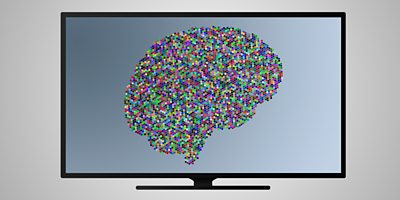Our teams in BBC Research & Development are always looking at how technology could impact the BBC and the wider industry in the coming years. In fact, it’s baked into the BBC Charter to look at the opportunities and challenges this may bring – to be prepared for it – and to share learnings with others.

One such trend is the emergence of Artificial Intelligence (AI) and Machine Learning (MI). Towards the end of last year, Matthew Postgate, Chief Technology and Product Officer for the BBC outlined in a speech to the industry the role the BBC should play in this debate – bringing partners together, showing the way and ensuring the public service principles are at the heart of any developments. We were fascinated by the discussion.
Last night, at an RTS event in London, we shared initial plans for our next experiment.
Later this year, BBC R&D and BBC Four will work together to conduct an experiment using AI and MI. The purpose is to explore what might happen if algorithms and machine learning are used to search out BBC content from the archive that would connect with and be relevant to a BBC Four audience. This content would be highlighted to the BBC Four scheduling team, and used to schedule an evening’s worth of output.
- #ArtificialIntelligence in #Broadcasting : #BBC: We asked ourselves three questions 1) can a computer really capture the spirit of BBC Four 2) what else can we analyse beyond programmes and 3) how responsive would it be? #RTSAIBroadcasting pic.twitter.com/gt2mma5IRV — Maria Rua Aguete (@mariaaguete) May 16, 2018
We want to use this to learn whether technology can help us uncover hidden treasures across genres and programming that that we think BBC Four audiences might love. It will also help us look at the limitations and challenges around using this technology to support and enhance the BBC’s world-renowned skills in content curation and delivery. And let’s just be clear – this will not replace our schedulers. Far from it. Humans have nuance, taste and judgement – the qualities of which no algorithm or machine can replace. This is all about looking at whether technology can help them even further.
This trial, along with other experiments across BBC R&D will help shape our thoughts on the potential uses and limitations of AI and MI in the future.
- Tweet This - Share on Facebook
- BBC R&D - AI Production
- BBC R&D - Data Science Research Partnership
- BBC R&D - The Business of Bots
- BBC R&D - Editorial Algorithms
- BBC R&D - Using Algorithms to Understand Content
- BBC R&D - COMMA
- BBC R&D - Content Analysis Toolkit
- BBC News Labs - What we talk about when we talk about fair AI
- BBC R&D - Natural Language Processing
- BBC Technology + Creativity Blog - Fighting bias in the machines
- BBC Technology + Creativity Blog - AI for Common Good
- BBC R&D - CODAM
- BBC iWonder - 15 Key Moments in the Story of Artificial Intelligence
- Wikipedia - Artificial Intelligence
- BBC News - Artificial Intelligence
- BBC News - Intelligent Machines
-

Internet Research and Future Services section
The Internet Research and Future Services section is an interdisciplinary team of researchers, technologists, designers, and data scientists who carry out original research to solve problems for the BBC. Our work focuses on the intersection of audience needs and public service values, with digital media and machine learning. We develop research insights, prototypes and systems using experimental approaches and emerging technologies.


